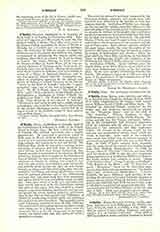

O’Reilly, EDMUND, theologian, b. in London, April 30, 1811; d. at Dublin, November 10, 1878. Educated at Clongowes and Maynooth, he made his theological studies at Rome, where after seven years in the Roman College he gained the decree of Doctor of Divinity by a “public act” de universa theologia. After his ordination in 1838 he taught theology for thirteen years at Maynooth into which he was mainly instrumental in introducing the Roman spirit and tradition, after which he entered the Jesuit novitiate at Naples. He taught theology for some years at St. Beuno’s College in North Wales till he was appointed Professor of Theology under Newman in the Catholic University of Ireland. During the remainder of his life he resided at Milltown Park near Dublin as rector of a House of Spiritual Exercises; and he was Provincial of Ireland 1863-70. Constantly consulted on theological questions by the bishops and priests of Ireland, Cardinal Newman in his famous “Letter to the Duke of Norfolk” calls him “a great authority” and “one of the first theologians of the day”. Dr. W. G. Ward, editor of “The Dublin review”, said: “It is a great loss to the Church that so distinguished a theologian as Father O’Reilly has published so little”. Dr. Ward wrote of his chief work, “The Relations of the Church to Society“, “Whatever is written by so able and so solidly learned a theologian, one so docile to the Church and so fixed in the ancient theological paths, cannot but be of signal benefit to the Catholic reader in these anxious and perilous times.”
MATTHEW RUSSELL

